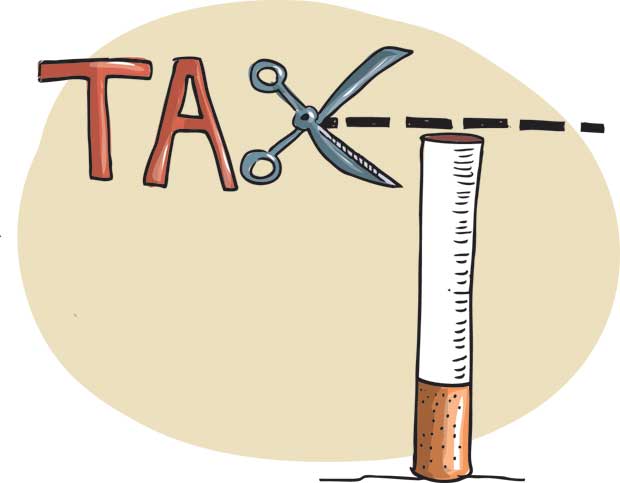Reply To:
Name - Reply Comment
Last Updated : 2024-05-10 15:33:00

 hough Sri Lanka is proclaimed to be free and sovereign, it is known that behind the scenes there is large scale lobbying by transnational companies connected to multi-million dollar areas such as pharmaceuticals, food or nutrition and tobacco. They operate through top politicians, officials and vested interests to continue what social analysts see as economic neocolonialism.
hough Sri Lanka is proclaimed to be free and sovereign, it is known that behind the scenes there is large scale lobbying by transnational companies connected to multi-million dollar areas such as pharmaceuticals, food or nutrition and tobacco. They operate through top politicians, officials and vested interests to continue what social analysts see as economic neocolonialism.
We focus on this huge though largely unseen issue because the Cabinet today is likely to take up the proposed increase in tobacco tax, with the tobacco industry apparently spreading some falsehoods or smoke without fire through sections of the media or journalists who are apparently unaware of who is using them and for what.
According to the Alcohol and Drug Information Centre (ADIC), the tobacco industry’s falsehood relating to the increase in tobacco tax are based on the prices of cigarettes in Sri Lanka compared to other countries. The industry and its vested interests have made little or no reference to the more important issue of affordability. Social analysts reveal that cigarettes are almost twice as affordable now, compared to the year 2000. Most economists agree that affordability is calculated using the per capita income, rate of inflation and household income.
The proposals to increase tobacco tax was made by the National Alcohol and Tobacco Authority (NATA) and was based on an extensive technical study by experts who used data obtained during the past two decades. The results of these were also analyzed and accepted by tobacco economics experts at the World Health Organization (WHO).
The analysts say increasing taxation will increase government revenue and also reduce consumption especially among the young and the poor. This will be a win-win situation for the country. Though a large amount of excise tax is collected from tobacco, the studies show there is a lot of scope for the government to collect more taxes and at the same time reduce consumption. The analysts say that if taxes are already 86%, as claimed by the industry why should the company and its supporters object to making it 90%? They point out that during the current year, the increase in taxes collected from the tobacco industry is due to the government increasing taxes in the past and is not a voluntary contribution of the industry.
World health experts agree that tobacco kills and there is nothing such as a safe level of smoking. In Sri Lanka tobacco smoking is known to kill around 20,000 people each year. This means 55 people each day. This also means that at least 55 young people will be tempted or snared each day to keep the sales constant.
Analysts say that in this context the argument of value addition by the industry is baseless and absurd.
They say that on scientific, human and moral terms it is clear that such a company should not be allowed to operate. As the company and its supporters base their arguments on income only, they should be asked if the government should legalize heroin and obtain taxes, if it was the only consideration.
ADIC says that matters relating to the smoking of beedi and smuggling are two other bogies of the industry and its supporters. These arguments are regularly used by this industry in most countries when effective polices are implemented. In Sri Lanka, surveys show that beedi consumption is less than 9% among males. Few people are known to switch between beedi and cigarettes based on prices. Smuggling also is often sensationalized by the industry in most countries including Sri Lanka. The enforcement agencies have facts and figures to show that cigarette smuggling has not increased because of the increasing prices of cigarettes. Reports say that British American Tobacco (BAT) has been caught in several countries smuggling cigarettes and its executives fined or jailed.
ADIC says the governments should not be afraid of the smuggling of any product. If so, no taxes should be levied on any product for the fear of smuggling. This year, in India the industry threatened to close its factories if the 85% pictorial warning was implemented and actually closed some factories. But as the government did not give in, the industry has restarted production.
Analysts also point out that though the company claims that its corporate social responsibility (CSR) activities benefit around 18,000 families, smoking will kill the breadwinners of more than 20,000 families this year too as in the past leaving 20,000 new windows and at least 30,000 children without fathers. If the past five years is considered this translates to 100,000 deaths, 100,000 widows and at least 120,000 children who have lost their fathers. What a tragedy and a horror.

Add comment
Comments will be edited (grammar, spelling and slang) and authorized at the discretion of Daily Mirror online. The website also has the right not to publish selected comments.
Reply To:
Name - Reply Comment
US authorities are currently reviewing the manifest of every cargo aboard MV
On March 26, a couple arriving from Thailand was arrested with 88 live animal
According to villagers from Naula-Moragolla out of 105 families 80 can afford
Is the situation in Sri Lanka so grim that locals harbour hope that they coul
6 hours ago
6 hours ago

09 May 2024
09 May 2024
09 May 2024